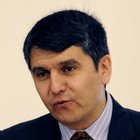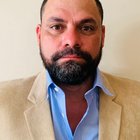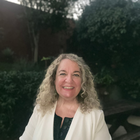0:00:15.46
Well, good evening, everyone. It's a pleasure and an honor to be here at a GFN with a small Spanish station. It's a pleasure to talk in our.
0:00:25.67
Own language, semihantes doctors.
0:00:29.66
And for me, it's a pleasure to have such the ones we have up here who are doing such good job in harm reduction in Spain and in Latin America. The panel will talk about if a doctor actually has a moral obligation to work against harm reduction. To work for harm reduction. Sorry, I've worked with this for ten years and doctors sometimes come up to me and say support me. Are they scared? Publicly support harm reduction? We'll serve some small questions and then we'll have an interesting debate. First of all, I'll present Dr. Teran, a speaker from the Quito University. Why are there not more doctors in Ecuador defending harm reduction? Tobacco harm reduction? Thank you to the organizers for giving us this opportunity to talk about this issue. And I think this is something that affects us, the whole region. First of all, there's not adequate preparation regarding a tactic arm done by tobacco. There are enough tools, it's not talked about enough. The topic isn't even discussed in universities and it's seen as negative. Secondly, social pressure. Unfortunately, if you publicly want to defend the topic of harm reduction, you're midly stigmatized, you're attacked, you're appointed at. And that means that most professionals, even if they might be in favor of this movement, they decide not to.
0:03:01.14
Especially.
0:03:01.67
If their work atmosphere opposes it, because the pressure of the public system ensures that this happens and that people don't support it. Well, yeah, sometimes I managed to get doctors to support this. It tends to be doctors have nothing to lose. Doctors are older that no one can remove them from their positions. But when you have a young doctor that wants to say this, they're terrorized, they're afraid, they're afraid of losing their job, they're afraid of not getting promotions, et cetera. And it's a shame. I'm going to ask Ferdando the same question from Spain. Why are there not more doctors that defend tobacco harm reduction? Bane there are two fundamentals. First one is that government institutions don't promote it. There is harm reduction aspects such as cars, such as food, pharmacological, pharmaceutical products regarding drug addiction, it exists except for everything such as tobacco. If a government, especially sanitary sections, don't promote this, it means that people express their opinion. It's a scientific opinion, it's based on something, it's not opinions. When we decide to support initiatives in favor of harm reduction regarding tobacco, it's because we see there are errors and there are problems that aren't fixed. In Spain, we have a large percentage of us, of the population that still smokes, despite the projects that have been presented throughout time and projects that have had good results. But those measures aren't reaching the population. That's why we don't reach numbers that countries such as Sweden and the united Kingdom have, which will be talked about a lot. If we don't reach those measures, what we'll have to do is look at other methods of doing, of reaching it. We can't stay in that same speech when US doctors talk favor of this and promote it so that other colleagues have enough information to make their own decisions, which is something you don't learn at university. And you want to form people and inform people with information, with comparing different information. And I'm sure I have mistakes while I expose my information, I would need someone that doesn't have my same opinion to look at it, because working together, we might reach an agreement. But if the government doesn't promote it and it marks like what happens in Spain, a democratic country in Europe, the Health Ministry has closed a summit that we did in Spain, not only of national figures, but it was an international summit which wasn't going to be celebrated in a back room of my home. It was going to be done in a public university, which is where science is to be debated. But when the government tries to silence you, it'll be really easy to say that I'm not right, but we should be discussing things. What they do is they silence you, silence the voices that don't follow the official speech. What happens to most of us is that they don't want problems. My position enables me to not be afraid of being attacked by colleagues that work in the private sector who say that they can't help Domia Podia, terminar and I'll and I'll end up losing my job. And that's a huge problem. Yes, unfortunately, this is truth. This is true. There are many cases, mine is a specific contract shows that even important people can be silenced. Their doctors have been kicked out of universities for investigating harm reduction. So they decide not to get involved ever again. And we're not talking about young people. There's important doctors, projects are taken away from them. They're silenced. They don't enable it, enable them to talk. It's incredible. This is science. What's the problem with but they react with violence. At the end of day, it's violence when facing this violence. I'm going to start with you, Sylvia. How do you doctors sylvia is a toxicologist from Brazil. How do these attempts at discrediting you? Has this happened to you? How do you manage it? Well, first of all, I would like to say hi to everyone that's here, everyone that's here participating in this debate, and especially Carmen, who invited me and gave me the chance to talk in Portuguese, Spanish to all of you. To start with, I'm a toxicologist and I work and I study harm reduction 20 years, 30 years. As the Dr. Fernando said, I started working with harm reduction with illegal drugs. So my focus was crack cocaine. I don't know what they're calling Spanish, but in Brazil we call them las aprofume, which are volatile smells. This has been my life studying the way of reducing damage to people who depend on certain products that couldn't stop or didn't want to stop. But we were talking about illegal substances and we started talking about harm reduction of tobacco. The same thing happened. There's always been an answer to say that harm reduction in conservative countries is seen as promoting the consumption of these products, and it's not true. People think harm reduction can't be done with tobacco. That's what they think. So it's a tough problem to overcome. As a toxicologist myself and talk about the scientific side and talk about what substance do to the body, I started to talk about what I thought was important. There's a need to reduce the effects that a product has on a person doesn't want to stop or the person that can't stop using it. So once we started talking about all this and due to my history of toxicology, they started calling me to provide speeches regarding these issues. I led a group from Brazil in this, and that's why my name was put on a blacklist of people that.
0:13:21.59
Copala Industrial, that the tobacco.
0:13:31.34
Companies oppose and pay attention to. And that upset me because I've always tried to show that I was talking from a toxicology point of view, how substance acts on the body and splitting the damage done by different products and different components that maybe can cause cancer. So my name yeah, I went onto this black house along with other along with other people, and we had to move a lot of stones and prove that what my point of view has been for 30 years. Harm reduction is often talked in general and we've always had this issue of people thinking we're promoting these substances. We had a colleague in the Sao Paulo University had a very interesting product regarding ecstasies ecstasy, and she talked about damage reduction in parties. Her financing was removed, she had government financing, and she never managed to keep going with this project. So, yeah, I think we have to talk more. We have to inform people more about what harm reduction is and break that concept that we're promoting the use. No, it's just a guarantee that the person can use and have the lowest damage possible. Yeah, I completely agree. And I'd love to know under what authority you have to prove to someone that you're not told what to do. You have to prove and prove that the industry hasn't paid you, because if not, they'll destroy your career. It's terrifying. And I'll make this ask the same question to Roberto. Roberto doesn't need a presentation. Thank you. Garmin, same question to you. Well, I'm not a doctor, although I'm proud to say that despite being a doctor in physics, I once gave birth to a child. But I have a lot of experience with doctors as a patient, which is important, typically in questionnaires. I say that I don't smoke, and that's it. But when I had cancer, which I had quite a few times, you have a closer relationship with doctors. Not only of oncologists, with surgeons, ophthalmologists, all type of doctors. And yeah, I tell them that I use ecigarettes. I don't hide that from them. And interestingly enough, either, the Gorbachev in closet effect. So many years ago, Gorbachev was there without saying anything until the right moment arrived. And I feel there's a lot of closet garbagehovs. I'm not going to say my oncologist is delighted that I vape. He told me that it might not be good, it might not be the best thing for me, but taking tobacco is good, is what he said. He never said, no, we can't talk. He told me it wasn't good, but I could use it. And in general, that's approach taken by doctors, one thing is what is private, and another thing is for them to express this. For example, I mentioned my works for the physics and chemistry of this, and I've shown my works. I wanted to be able to talk in the hospital, not about medicine itself, about how the products work. But you see through their body language that this terrorized the doctors. So what happens? I compare this misinformation with asphasis, with gas. There might have been an article published, and it's very small pills, molecules that.
0:19:39.39
Are floating around, no escape, noisa Gaza persona. Yeah, telling.
0:19:51.14
So misinformation isn't very quickly. No, they release information very slowly. It's like molecules in the air.
0:20:03.90
Exist.
0:20:10.94
It's medical societies a lot of times that promote this. In Mexico, the government is biggest publicitor of the Bloomberg Group, and that's why they receive money. Do you imagine Joe biden? Joe Biden probably hates vapors, but do you see him on publicity, speaking to 20 million Americans, saying that vaping kills? Do you see Joe Biden doing this? Well, Lopez Sabbathar has done it.
0:20:46.28
Political mismodi, school, so matla, cacophonia.
0:21:02.70
All this generates a disfavorable environment. How can we break this? It's tough. We have to wait for Stalin to die and for Gorbachev to rise. Gorbachev is there.
0:21:22.58
Consumer.
0:21:27.06
There'S a need for regulation. And it doesn't mean that we're going to be quiet until Stalin dies. We had to keep working, keep working, keep working to end. I'm not a doctor, I'm a professor. I'm at the highest level possible.
0:21:59.60
Academic.
0:22:02.08
Academically. I'm at the highest level possible. And I have 30 years of experience. They're not going to pressure me. But what happens around me, not in medicine, it put a ceiling on me. They didn't ban my investment electronic. They even look at it because it's disciplinary. But if at my university, I want to access promoting my science yeah, that's why you put a ceiling on me. Why? Because we don't want to provoke the government. That's what they tell me directly. I don't have Carmen's example. They can't take away a lab that I don't have. They can't take away my brain, but they put a ceiling on me. We have to reach the public. They're writers or poets, engineers. We have to reach them because they don't receive enough information. They read the New York Times. Who spread lies? So this is very important. And that's my experience. Thank you. Yeah, I'd like to add it. Yeah, but something we've talked about in the in the summit and the first attack, which was a threat, a threatened letter.
0:23:59.30
Guando real mendel to Los Antivapol.
0:24:07.56
It was when all the anti vaping groups agreed with editors and they started to accuse the director of university. And that's when the university just pulled away our summit. They're afraid. The society itself isn't scared of harm reduction, but they're scared of being pointed out about this. And that's a problem in a democratic country. A public university isn't allowed to talk about science. This didn't even happen in Franco's era. To what point are we allowing to back a control, to control the academic lives of people? To what point are we allowing this around this and around this control? We know that this affects the political vision and the regulation regarding harm reduction. Now, I'm going to present Randa, who's from Costa Rica, and I'm going to ask you, how are politicians affected in your country, for example, with the vision that has been installed in society regarding car reduction? Well, first of all, I'd like to thank the panel for an invitation. And the organization and everyone else present have had the possibility of participating into legislative expert for for four or five years of HIV legislation. And I managed a lot of things and this motivated me to get involved in this, to legislate or regulate the product regulation legislation regarding tobacco and such products in first place. The lack of information from the government is impressive. It's huge.
0:26:37.96
No, I'm being but I don't know.
0:26:45.18
Projecto. All of our work is very small. It's like we're ants working. If we learn how to do this, we'll end up reaching reaching the government or reaching our audience. The last one we did, we had to work very hard for them to learn very basic concepts. It's what us doctors have done since we started working. Always do this with our patients. Everything we do is for harm reduction. For them, it's just now taking this name that it previously didn't have. It would be very pretentious for us to say that we hear people and that's the concept. Another vision that we have is that from the start we're used to base our work on evidence based medicine. And once we take scientific data to many directors, they start pulling away despite one plus one being two. Sometimes it's tedious. You try to advance and they seem to not have understood. But yeah, I'm not that pessimistic. I'm optimistic. It seems that after a long time, people end up learning. They start understanding our concepts. But you have to know who to look for and keep insisting. Keep insisting. That's my recommendation. Yeah. In fact, I know it's true that when you go closer, you get closer to a regulator or a legislator at the back of their heads, they already have the newspaper headlines saying that this is worse than tobacco, because that's what they read. They don't have that much time to read, everman. But on the other side, politicians receive pressure groups and tobacco companies have been working with governments throughout the world for more than 30 years. I've been hearing tobacco control for very long time too. And once you bring something that completely poses what they say and completely poses what the newspaper headlines say, the politicians will receive you with hesitation.
0:29:53.70
Politico is automatic.
0:30:01.56
And whenever a doctor apparently goes to talk to you and says something regarding this, they're immediately accused of being paid for two by tobacco companies. So they're immediately not listened to. It's something that's very different to change because of what you guys have said, because it's tough to explain to a legislature, to explain what an Ecigarette is, and because they've already been told to be against this. Before I'll ask the same question to Dr. Diego Verastro.
0:30:38.66
Montonaso.
0:30:42.44
You've been in a lot of conferences, you've talked to a lot of politicians. What's your experience? Well, thanks to the organization and to my colleagues, it's a David versus Goliath kind of fight. It's tough to make sure that politicians understand this change in technology and science. They will have to change their way of thinking, their politics surrounding this issue. So for them to understand this, they have to want to open their heads first, explain to be able to transmit how tobacco harm reduction works. They see other methods, such as gums, but none of them have something similar to the active smoking, which is releasing a sort of vapor. So they think it's very similar to smoking, or it's the same as smoking. So it's hard to make them understand that it's not the same thing. This requires a lot of energy, it's tiring. We participated with a lot of legislators that had been a doctrine that had been taught these issues before, so it's hard to break that ice. So we often said a word. We're going to tell them the other side of this story, which coincidentally is a true story of this issue, but it's complicated expertise beyond our expertise, which is the movement of money that is done through politicians. So because we're beyond evil, we're multimillionaires of lamborghinis due to tobacco companies, it's tough to get them to understand that legislating and regulating these products, such as the consumption of alcohol, was at one point regulated. Regulating driving or regulating flying planes. Yeah, these products had to be regulated too.
0:33:33.10
Political.
0:33:35.58
It's a tough ask because I try to show politicians they might not make money, but this will last forever. This will create change throughout humanity. And as doctors, we're in an era of change where we're creating history. When we study medicine, we study flaming with penicillin and other pressures, while the future look at us in that way because we're making history, we're promoting this because we're doctors, because we want to save lives, because we don't want to damage people. And sometimes politicians struggle to understand this. Well, I completely agree. And talk about medicine and doctors. Well, we're not all doctors here, but almost as doctors. What consequences does denying the consequence, denying tobacco harm reduction? First of all, with patients and consumers, when patients say that vaping is worse than tobacco, how do you deal with all this? I'll start when you guys are talking. I was thinking that every time arm reduction is talked about, it's talked about in relationship with illegal substances for more than 30 years. We have a fight against against drugs and the result is there for everyone to see it. It hasn't worked. And if we keep doing the same thing, we won't control anything at all. Well, what relationship does this have of Ecigarettes and electronic devices in Brazil? They've been banned since 2009, and yet they're still used. They're not properly used. We don't know the quality, where it comes from, where they go, who uses it, who doesn't, what it can be used for, where to buy it. But people still use it. I think not regulating it, not talking about this.
0:36:22.42
Castor, ISO, vatrazar, todaviamas.
0:36:31.80
This will delay everything further. It will damage people, it will damage the population. From my point of view, I think we have to regulate, not ban. When you ban things, there are more illegal products that arise and also be used by people illegally. So I think proper regulation and not prohibition, just like I say for any other substances, I think they should all be controlled, not banned. In the previous table, they talked slightly about this and I was hearing it, and that idea came to my mind. And they were talking about how substances can be used throughout medicine. And I remember that after many years being banned, they started studying the medicinal use of LSD, which are drugs, which I've seen as super bad, which even cause a dependency. The compulsive use of it doesn't even exist.
0:37:58.90
Makinacosa mismo Patamar prohibition solo.
0:38:07.67
So, yeah, prohibition damages science. That's what I'd like to say. Well, when we're with patients, it's frustrating on some occasions because it's easy to say, oh, they should stop smoking, but only two to 5% of people manage to quit immediately. So let's use pharmaceuticals. We discard the problem that arise from champions. So let's move on to another product. But I have patients that I can't provide it to. I have pregnant people. Andreot, andreot, what can I do of all this? What do I do with consumers? Let's open another door. If there are countries that using this door, have managed to reduce, to have the lowest tobacco rates in the whole world. I'm not talking about Europe, I'm talking about the world. Let's look at Sweden. Are they fools? Are they wrong? No. If their politics worked and I don't apply it, which I could apply in different ways, I'm saying that their decisions are wrong. Am I? Has tobaccoism been reduced but cancers? No. They have the lowest cancer rates too, therefore and they've been using it since 1970, which shows that these cigarettes don't only have 20 years of life. So we don't have to wait another 20 years. Sometimes, yeah, the effects of smoking aren't shown for a lot of years. Well, they've had it since 1970 and we can't see this. So it's frustrating. So, yes, doctors are obliged to reduce harm. We do this with everything, any operation you told, for example, not to not to eat this. We should inform people and we should promote that. The World's Health Organization talks about this because they talk about harm reduction and everything, but tobacco beneficial institutions should and that we don't want an economic benefit, we want health benefit. And even despite this, some patients will be able to say that they still want to smoke cigarettes, and we might have to look at even more options for them to quit it. But we have to try. Clearly, my patients don't say this when they see me because I vape while I attend them. Not long ago, looking at some works done on nicotine, I was surprised with most of them, because most of the studies done regarding nicotine were related to combustion, to consuming nicotine through combustion. So all these works will have to be revised and seen with nicotine without combustion. As Roberto said previously, the vaping issue is a tsunami that's coming, so it'll probably go against nicotine rather than the method itself. And nicotine replacement, therapies in in some countries can be used with users from 15 years of age. So the difference with a spray and guns that include nicotine compared to vaping is huge. There's a lack of intellectual honesty in all of this. Nicotine opens up a huge field, not only in the neurological side, with anxiety, as was mentioned before, but also has a disinflammatory effect. It's used to fight psoriasis issues, of neurological damage too. Sleep issues as well. If studies are done with studies separated from combustion, a lot of this could advance. And if my patients say that it's worse than smoking, well, a visit that should have lasted half an hour will last an hour and a half. And as I'll explain all of the things I know, okay, let's keep advancing very quickly. Well, I think that taking apart the specific issue of a patient let's talk about the population in general. We have to be objective regarding which methods can be installed. There's no doubt that arm reduction has advanced slightly, but we know the results that we could achieve. So we have to think about what else we can implement. The message can't be changed or adapted. We've never said this is good or this is healthy. We don't defend something that doesn't exist. We say it's less damaging, it's less bad. And under that concept they must understand the responsibility of the state, any state, to provide people to access that possibility, to avoid parallel markets by contraband which put customers at risk even more, the consumption of products that haven't been tested. We have to insist of this double responsibility, what the state is doing and decision makers is to say that smoking conventional cigarettes is better than looking at other alternatives. We have to keep insisting that we have to bake this scientifically, academically based on evidence and evidence that has to be acquired. Any information that's produced isn't even looked at with the proper analysis, which is a shame. I'm going to give a practical example to close this section. I insist that we have to form ourselves, educate ourselves, educate all of the professionals that work in health. What happens if I, et cetera, et cetera, if I give talks and then patient arrives, I'm a rectifier, I'm a urologist, and a patient arrives saying that they have lack of erections. Well, eight out of ten people, eight out of ten consumers may have that issue. So we ask them how much they smoke, how much they consume, and see what we're going to do. And they go to pharmacy and they say well, that's worse than smoking. That happens to all of us doctors. Those people are ignorant in this issues and it throws all of our work to waste. We have to teach professionals, we have to teach people that are going to work alongside our patients to not throw all of our work to the trash subsequent. That's really bad for you. Do they actually know this? We have to educate ourselves and educate everyone that's around us. Very good. We don't have that much time. We'll still do. It briefly, the debate of the century, the conflict of interest, is it a lie? The conflicts of interest of tobacco, harm reduction, is it a lie? Well, everyone has a conflict of interest. No one's pure air isn't pure, it doesn't exist. Well, neither does a person with no conflict of interest exists. The biggest problem with how it's handled, it's not marked just like contamination. There's nowhere in the world but we set a standard, a certain level. Under that level we can say that there's no contamination. And this also applies for us the way it's handled with tobacco Control, the World Health Organization, all of the organizations associated to Bloomberg as they extend this. I've seen someone say that to assist to a certain event, you have to prove that no one of your family up to six different levels come from where my predecessors come from, like, six times back. Come on, it's ridiculous. It's important to request this when they say a conflict of interest well, define this conflict of interest where is it? And that's where they'll fall. I've been banned due to an apparent conflict of interest to participate in the Senate well, where's the evidence? Apparently it's because I belong to a civil organization in Mexico that granted grants and that's the evidence apparently but when they publicly express the evidence I'll knock them out because they have to define conflicts of interest when has anyone paid me? I can meet up with tobacco companies or go to a restaurant with them. It has nothing to do talking with legislators isn't a conflict of interest. They should define these conflicts of interest that they mentioned. And once it's defined, we should attack them because we have legal alternatives to demand them. We might lose, but it's a gas effect. We might lose our case. But there has been a case. If we all do this, if we all request this, once they define our conflicts of interest and they define them properly, they have to prove that I've been paid to, that I've received payments from tobacco companies, and they can't prove it. Well, we have to take them to court. We have to do this. I completely agree with you. Someone has to do something because it reaches a point where they're destroying people's lives or destroying careers, doctors, scientists simply by creating a negative image and reducing their credibility. It's criminal. It's criminal. What? They're good.
0:53:34.86
Terminologia el conflict of interest.
0:53:38.70
Commodice Roberto the conflicts of interest, as Roberto mentioned will always exist but has to be declared and that's where their evil arises pretend to hide something that doesn't exist a couple of weeks ago. We're discussing the freedom that investigators have to report their results with a sponsor. And a conflict of interest issue arises. If I work for the US. Government, how free am I to express everything? If a tobacco company backs me, how free am I? And declaring sponsors frees the communication of our results. Because if I freely say that I've been financed by such company or such group have the capacity of showing what I've found, yet they use this information that you've been paid by such group and they say that you've used your preparation and you use your studies to show something in their favor, to give a false result. That's where you have to defend yourself. I'm not as radical as Roberto to take people to court, but I believe scientists should have that freedom. I've been invited to give conferences and I'll just show what I've studied, show my studies. There's no point in hiding sponsors. But we should defend the fact that that doesn't show that our opinions are skewed.
0:55:54.12
Pandona Industrial investigation.
0:56:00.30
We must locate Pacific Contest. There's a double standard regarding this. There's some trash works which are backed by the big pharma and they're trash and yet they're not accused of anything. They'd lose so much money, yet no one argues. With them, with their conflict of interest. I found the conflict of interest. Once we start talking about tobacco harm reduction, it doesn't exist in surgeries. No one argues with a surgeon because he works with a certain brand. It's insane. It's insane.
0:57:10.18
Why?
0:57:10.51
It's aimed at not aimed at other sectors. It's intellectual dishonesty. This shows even in the public sector, the people that will go to a cop and make decisions has a conflict of interest because he'll be told what to do. That's conflict of interest or will all countries what they want and that conflicts of interest affects all of us. And I'm going to steal what Roberto said. Tell us what the conflict of interest is. I'll be accused of conflicts of interest for anything. Pfizer doesn't pay me anything. I'm going to highlight what what you said. Cop Ten will be celebrated soon. All of organizations that will that will go there, financed either by Bloomberg or Big Pharma or other sectors. Is that not a conflict of interest? Yet you you're a doctor who works in tobacco harm reduction. You have to be listened to and due to a simple fact that you support tobacco harm reduction, you're paid by tobacco companies. That's not true. Never. What's a conflict of interest? We have to see how defined in magazines too. I once had a huge problem and my article ended up being rejected. Go to any medicine magazine that has to do with health and you'll see them talk about the financial conflicts and ideological conflicts which is not properly defined as questionable. Let's say I'm a Catholic and I'm going to talk about the reproductive system and the biology. The Vatican doesn't pay me. I'm simply Catholic and have certain ideas that come from Catholicism. Will I be undermined due to the fact that I go to Mass every weekend? Does that mean I can't talk about human reproduction? No, that's why definitions are important. But I'd love for you all to go into different magazines and read about conflicts of interest and read their definitions. Their definition of it is abusive and we have to fight it. I own my own ideology and if my way of thinking is to support harm reduction, it's not actually conflict whether.
1:00:47.75
The phoenix her fishiositos.
1:01:03.18
Organisa salute. See Bali.
1:01:22.90
Valida ila Regulacion escuna Vesmas canoe existe. No exist. Regulacion existo. Imaluso Claros is del POSICON amiento de cuado Poreso lake Sequencia losingosotos tenemosion para yudar adejar de former Tasadims Libre sync exist and in guntipo de control porcantos jeva auna sobre commercialision no ikemore pork la le sea is a cumpla el control de veria star a cargo del processo.
1:02:28.98
De publicoido.
1:02:58.90
Eptro cultural regulatory universe de la hopsiono per cap suicide inglatera no. As well the as Pania gon Susal tivaco regulatorios TN lopsion de la relucian de Danios obtar pores peroparapaisa Ladino americano como Argentina, Brazil, Mexico ke one of Solo mente esopsion Say is de Sarojados Omeno de Sarojado differentiates paralluno PISCES c existe la option de la reulusion. Ila reduction de danios I parotropis la unico no prepared impression.
1:04:36.78
Patrias ipoir as in auto, latitude, personal mente el projector positive as casinos. Mehra filter loran dr. Terrangio ivan dr. Berra agamunostra propia statistica. Contrast to you locale impacting. Estopunto. Estracas. Amos.
1:05:34.58
We should make our own studies and try to implement them. Kids used to be measured of the Grove measurements done by dummy Germans because we didn't have those numbers for ourselves. When did this improve? When we started measuring, having our own measurements. That's when we started growing. And to complete what you said, I believe that I know where your question is coming from. And it's that until and the politicians that we vote, who have the power to make decisions in Senate focus on harm reduction, we won't advance. England managed it because the politicians understood what harm reduction meant and acted based on it. In Latin America, we don't have those politicians yet with an open mind who don't think about political advantages. Until we have these kinds of politicians, we'll still be able to present ourselves and be activists. But we need that politician, the politicians, for this to become a reality. Regarding public health, 53 years have gone by since the start of the battle against drugs. Post traumatic people with post traumatic stress disorder have been damaged and you talk about LSD with them previously. We're seeing depression in people and it's one of the sectors that's most affected by us. And they would benefit a lot if studies with nicotine had received more attention. How doctors treat this pragmatism regarding the investigation with these issues, it's a paradox and it's tough to analyze it. The father of evidence based medicine said that in ten years, most of the things we know today will be false. The issue is what half of these issues will be false, which half of it now? The World Health Organization talks about sweeteners the biggest evil yet ten years ago they will throw this and against sugar. So it's about anticipating prudent. We have to advance slowly, and that's what happens with nicotine. There's a myth against nicotine and now there's scientific evidence that it worked. That has some positive effect. There's huge number of studies on this. Well, unfortunately, we don't have enough time. I would stay here all afternoon, but I'd like to close down three issues to answer our question is it a moral and ethical obligation for health professionals to promote harm reduction? Yes. I believe that we should defend what you've studied, not what you've been told to say. It's what you've sworn by. It's a moral responsibility to not block the debate. It should rise naturally. We should promote an ethical behavior throughout the sector. Some academics won't debate and the other have are terrified of debating. So they use this debate, this conflict of interest issue, to not even have to debate about this. Countries such as Spain, it happens a lot. We don't even debate. And the final conclusion is what are you afraid of? You're scientists, you've been educated to sit down and debate on science. What are you afraid of? And it's a shame because it ends up affecting people's lives, because science does doesn't develop properly. It ends up affecting society and people end up dying. And it's a true shame. Thanks a lot to everyone. Bye.














